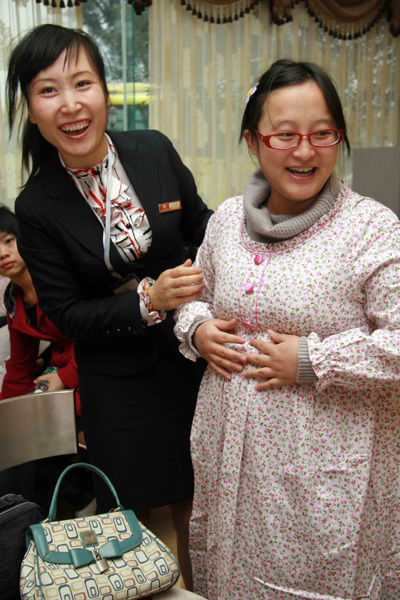 |
|
An expectant mother at the Angel Hospital in Chengdu, Sichuan province. All the hospitals are run by Putian-based healthcare tycoons.Huang Jiaming / for China Daily |
However, it was their treatment of sexually transmitted diseases that catapulted Putian's itinerant physicians into the national spotlight. In the 1990s, as prostitution became more visible in China, incidences of sexually transmitted diseases began to rise, but few public hospitals had facilities to treat the conditions. Moreover, even when clinics could offer treatment, many patients were too embarrassed to register under their real names, Chen said.
That combination of circumstances allowed the Putian physicians to break into the STD market. They established small clinics in alleyways across the country and glued their ads, which highlighted the phrase "keeping patients' secrets", to lampposts, not notice boards, he added.
In an interview with the magazine Entrepreneur, published in April, Zhan Guotuan said that given the huge potential profits in the medical market, the Putian physicians were simply not satisfied running small clinics.
In the 1990s, they formed companies and started to sign contracts with public hospitals to run specific departments, such as andrology - or male, and especially sexual, health - and dermatology, Zhan said.
Although the mode, known as the "hospital within a hospital" system, was copied countless times across the nation, the uniformly high treatment costs provoked controversy.
In 1998, Wang Hai, a vigilante consumer advocate, launched a probe into the medical sector, and later published a report in which he claimed that the practitioners from Putian sold 10-yuan bottles of STD treatment for 200 yuan.
The report also questioned their eligibility and qualifications after healthy patients were diagnosed with STDs in the "hospital within hospital" system.
Wang's investigation was followed by a series of media reports that exposed fraudulent activities in hospital departments operated by Putian-based entrepreneurs in a number of cities, and concluded that the episodes had severely damaged the credibility of public hospitals.
In 2000, the State Council issued guidelines forbidding public hospitals from signing "hospital within a hospital" contracts or cooperating on projects with the companies.
However, the policy change failed to derail the activities of the entrepreneurs, who further expanded their influence in the country's medical sector by buying public hospitals and setting up private centers.
According to an article published by the magazine Business in October 2013, Zhan Guotuan had an interest in more than 30 private hospitals, while Huang Defeng owned about 30 maternity hospitals in Beijing, Tianjin, and in Hebei province.
Although the number of privately owned hospitals didn't lag far behind public institutions in 2012, the number of patients who used them accounted for just 9 percent of total consultations, according to the then-ministry of health.
Chen Lujiang, a surgeon at Fuxing Hospital, a private establishment with connections to Putian, said his workload is far lighter than that of his peers in public hospitals because so few of his patients need to stay in the hospital.
The disparity in patient numbers resulted in private hospitals focusing on specific departments, said Chen Donghai, an executive with the Fuzhou-based Gulou Hospital, a private establishment owned by Zhan Yupeng, a relative of Zhan Guotuan.
